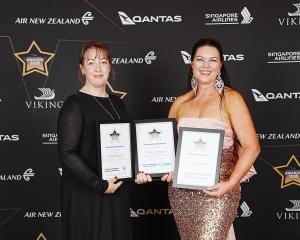Water meters could be trialled for a year in the Queenstown Lakes district, beginning next April, under a council staff plan.
The district council will consider the trial at its meeting tomorrow.
In a report for councillors, chief engineer Ulrich Glasner recommends the council approve a $275,000 trial to install 500 meters across the district.
The average cost would be $550 each.
The meters would be installed in all the district's seven communities, including residential, commercial, lifestyle block and council properties.
Based on average day population, the district used 416 litres a person a day compared with a national average of 290 litres, Mr Glasner said.
Water metering could help the council ''manage water demand growth more efficiently and cost-effectively''.
The aim of the trial was to assess the cost and practicalities of installing meters, quantify leakage in the network and on private property, and calculate how meters could reduce water use.
He acknowledged the likelihood of ''some adverse public comment'' on the trial, emphasising it would not involve direct charging for water based on use of the meters.
Councillor and sustainability practitioner Alexa Forbes said the district's water use was ''incredibly high'' compared with the national average.
Leakage was one possible reason, and metering would help detect where that was happening.
''From a sustainability perspective, you can't manage what you can't measure.
''People may say this is the first step in charging them for water, but that is not the consideration, but that doesn't mean it's off the agenda forever and a day.''
The argument that Queenstown did not have a water problem because it was by a lake and had plenty of rain did not account for the cost of pumping, treating and delivering water to people's sections, she said.
Council chief executive Adam Feeley told the Mountain Scene newspaper in September it was ''a question of time'' before installing water meters in new homes became mandatory.
Directly charging for water would reduce demand and prolong the capacity of water supply infrastructure.
Water was a commodity no different from electricity, Mr Feeley said.
''You imagine if everyone just played a flat rate for electricity - we'd all have our TVs going, our spa pools going, our heaters on.''
Advertisement













